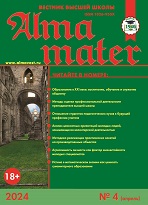UDC [338+631]"192"
https://doi.org/10.20339/AM.12-22.099
Evgeny G. Khrushchev, Lecturer Department of theory and history of state and law, South-West State University, Kursk, e-mail: deskssss@gmail.com
The relevance of the research topic is explained by the fact that outstanding successes in the socialist reorganization of agriculture caused huge changes in the life of the country. Deprived of their production base, the former exploiters did not disappear from life, but their social position changed. Many former exploiters went to work in enterprises and institutions, penetrated the collective farms and state farms. Some of them joined the ranks of declassed elements. In the fight against the dictatorship of the proletariat, the former exploiters used a new, unique tactic — the tactic of “sneak peeks”.
The purpose of the study is to conduct an analysis of policy in industry during the NEP period.
Tasks: historical and legal analysis of the characteristic features of the NEP as a necessary component of building economic ties and relations in the new state formation; assessment of the results of the economic development of the Soviet type of state under the new economic policy.
Methodology. To achieve the stated goal when considering the stated problem, in this article, such methods of scientific knowledge of reality as analysis and synthesis, as well as dialectical, logical, historical, and systemic methods were used.
Conclusion. By the end of the recovery period, the country was experiencing an economic boom. The political activity of all social groups in the country increased, including forces hostile to the dictatorship of the proletariat. The poor, on the other hand, turned out to be the least prepared for the new conditions in the countryside. In its activity and organization, it lagged behind other sections of the peasantry. In a number of cases, the inability of the party organizations to rally the poor peasantry together with the middle peasantry in order to secure their strong influence in the soviets also had an effect. As a result of all this, serious shortcomings, weaknesses and mistakes were revealed in the activities of the Soviets.
Key words: new economic policy, industry, economic potential, “war communism”, pricing, pricing policy
References
1. Aleksandrov, I.G. Economic zoning of Russia. About regionalization. Issues of economic zoning of the USSR (1917–1929). Moscow: Gospolitizdat, 1957. S. 65.
2. Bokarev, Yu.P. Socialist industry and small peasant economy in the USSR in the 1920s. Moscow: Nauka, 1989. P. 6.
3. Vorona, A.A., Khrushchev, E.G. NEP events in the industry in the 1920s: historical and theoretical analysis: Collection of scientific articles of the All-Russian Scientific and Practical Conference dedicated to the 55th anniversary of the SWSU “Values and norms of legal culture in the new digital reality”. South-Western State University, 2019. P. 22.
4. Ginzburg, A.M. To the question of labor productivity and wages in industry. Moscow, 1924.P. 32.
5. Goland Yu.M. Perspective planning under the NEP. Questions of Economics. 2019. No. 5. P. 151.
6. Devyatkina O.A. The development of a private fishing industry in the fishing industry of the Astrakhan province in the 1920s. Proceedings of the International Scientific and Practical Conference. Grozny, 2019. P. 137.
7. Dmitrenko, V. And Soviet economic policy in the first years of the proletarian dictatorship. Problems of regulation of market relations. Moscow: Nauka, 1986. P. 31.
8. Ilinykh, V.A. State regulation of the procurement grain market under the NEP (1921–1927). Novosibirsk, 2005. P. 54.
9. Levchenko, A.I., Snegireva, P.N. Food security during the NEP period: historical and legal analysis. Scientific research of young scientists: Collection of articles of the II International scientific and practical conference. Penza: Science and Education, 2020. P. 150–152.
10. Lenin V.I. Full composition of writings. 5th ed. Moscow: Politizdat, 1969. V. 34. July – October 1917. P. 151.
11. Maznova, S.V. The development of the industry of the Astrakhan province in 1921–1924. Proceedings of the International scientific-practical conference “Actual problems of modern science: the view of young scientists”. Grozny, 2019. P. 260.
12. Malashenko, I.V., Malashenko, A.A. State regulation of land relations in the Bryansk region in the first years of the NEP. Bulletin of the Bryansk State University. 2019. No. 1 (39). P. 87.
13. Nevlev V.V. Evolution of the legal nature of consumer cooperation during the NEP. History of State and Law. 2019. No. 4. P. 69.
14. Obukhova A.I. Socio-economic development during the years of the New Economic Policy: main features, shortcomings and contradictions. Humanitarian and legal problems of modern Russia: Proceedings of the XIV Interuniversity Student Scientific and Practical Conference. Novosibirsk, 2019. P. 320.
15. Orlov, I.B. New economic policy: history, experience, problems. Moscow, 1999. P. 21.
16. Polyakov, Yu.A. The transition to the NEP and the Soviet peasantry. Moscow: Nauka, 1967. P. 33.
17. Decree of the Presidium of the All-Russian Central Executive Committee on the approval of the Central Commission of the All-Russian Central Executive Committee for assistance to the starving of July 18, 1921. Collection of Laws. 1921. No. 55. Art. 342.
18. Rogalina, N.L. New economic policy and the peasantry. NEP: gains and losses. Collection of the articles. M.: Nauka, 1994. P. 139.
19. Salfetnikov, D.A. Features of the industrial development of the Kuban in the 1920s. (historical aspect). Social and humanitarian bulletin: All-Russian collection of scientific papers. Krasnodar, 2019. P. 79.
20. Khrushchev, E.G., Levchenko, A.I. Historical and legal concept of the development of food security: the experience of the NEP. Alma Mater (Vestnik vysshey shkoly). 2021. No. 5. P. 123–127. DOI: 10.20339/AM.05-21.123
21. Yakovleva, Yu.S., Bobryshova, V.N., Khrushchev, E.G. Repressive organs 1917–1936. Collection of scientific articles of the All-Russian scientific-practical conference dedicated to the 55th anniversary of SWSU “Values and norms of legal culture in the new digital reality”. South-Western State University, 2019. P. 179











.png)






